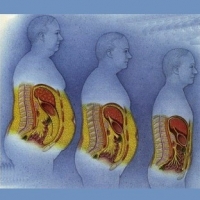Lose Weight > Weight Loss Tips > Weight Loss Articles > Sleep – The Forgotten Piece of Weight Loss Puzzle.
Sleep – The Forgotten Piece of Weight Loss Puzzle.
As unorthodox as it might sound , medical evidence shows us a fascinating link between our sleep and weight. Scientists say that our sleep patterns can effect our hormones in such a way that it can alter our appetite thus possibly influencing our weight.
As unorthodox as it might sound , medical evidence shows us a fascinating link between our sleep and weight. Scientists say that our sleep patterns can effect our hormones in such a way that it can alter our appetite thus possibly influencing our weight.
You must have observed a sleepless night that you might have had and than followed by a day when you were hungry through out the day no matter what and how much you ate. If so, then you have experienced the workings of the hormones leptin and ghrelin.
The two hormones that are responsible for altering and affecting your sleep patterns due to changes in your aptitude are leptin and ghrelin
Leptin circulates at levels proportional to body fat. Leptin is protein hormone that plays a key role in regulating energy intake and energy expenditure, including appetite and metabolism.
Ghrelin has now emerged as the first identified circulating hormone responsible for producing hunger. Ghrelin increases food intake and increase fat mass in our body.
Now to understand the connection between our sleep and how it can affect our diet and also alter our weight loss lets go through a study that appeared in the journal PLoS Medicine. This study suggests that short sleep duration is associated with high levels of ghrelin in our body which results in obesity. Scientists have discovered an inverse relationship between how much hours of sleep we get and the concentrations of ghrelin in our blood stream. They have observed that as the hours of sleep increase, ghrelin concentration gets considerably low in our blood stream, thereby potentially reducing appetite and making our weight loss more effective.
It was observed that when dieters in this study got a full night's sleep, they lost the same amount of weight as when they slept less. However the difference lies in observing what matter is lost from the body in order to lose all that wight. It was observed that when dieters got adequate sleep, than more than half of the weight they lost was fat. But when they cut back on their sleep, only one-fourth of their weight loss came from fat.
They also felt hungrier. It was further investigated that when the dieters reduced the amount of hours they were sleeping, they produced higher levels of ghrelin that triggered their hunger and also reduces energy expenditure.
So you want to lose weight? You need to immediately Change your sleep patterns! Following is the average amount of sleep we should be getting according to our age
Age and condition
Average amount of sleep per day
Newborn up to 18 hours
1–12 months 14–18 hours
1–3 years 12–15 hours
3–5 years 11–13 hours
5–12 years 9–11 hours
Adolescents 9–10 hours
Adults, including elderly 7–8 hours
Pregnant women 8(+) hours
To get a better night's sleep, you need to strengthen your natural sleeping patterns. You can do that by simply
Regularizing your sleep-wake patterns. Get up at the same time every day. If you wake up at 7 a.m. during the week, than follow the same sleep patterns during the weekends as well. Do not over sleep. Some people need at least ten hours of sleep every night; some are fine with eight hours. Find out what works best for you and then just follow that pattern.
Relax. Try to relax you mind and body. Start writing a diary and write down all your thoughts on paper and you will feel much relaxed.
.
Resist temptation. Try to resist drinking, smoking as it disrupt your sleep patterns. Also avoid intake of caffeine before going to bed as it also a stimulant that slows down the action of the hormones in the brain that cause sleep.
Alcohol does make you drowsy at first but it adversely effects your sleep patterns and makes them irregular and there is strong evidence that links alcoholism to insomnia;
Smoking has been found not only to disrupt your sleep patterns but also to reduce your total sleep time.
Skip the sugar. Eating high sugar foods and high fat snacks may fill you up initially and give you a drowsy effect but as soon as your blood sugar level goes down, you will wake up hungry and you wont be able to go back to sleep till you eat again. You can also not go to bed hungry because if you do, your brain will stay alert until you feed it.
Get moving. Keep active! Try to take a walk, ride your bike to work or go for a swim on a daily basis. Doing regular exercise will help you fall asleep quicker and it will also help you sleep for longer periods than if you don't exercise at all. Although it is also suggested that you should avoid heavy physical exercise within three hours of bedtime, or you'll be too charged up to go to sleep.
You must have observed a sleepless night that you might have had and than followed by a day when you were hungry through out the day no matter what and how much you ate. If so, then you have experienced the workings of the hormones leptin and ghrelin.
The two hormones that are responsible for altering and affecting your sleep patterns due to changes in your aptitude are leptin and ghrelin
Leptin circulates at levels proportional to body fat. Leptin is protein hormone that plays a key role in regulating energy intake and energy expenditure, including appetite and metabolism.
Ghrelin has now emerged as the first identified circulating hormone responsible for producing hunger. Ghrelin increases food intake and increase fat mass in our body.
Now to understand the connection between our sleep and how it can affect our diet and also alter our weight loss lets go through a study that appeared in the journal PLoS Medicine. This study suggests that short sleep duration is associated with high levels of ghrelin in our body which results in obesity. Scientists have discovered an inverse relationship between how much hours of sleep we get and the concentrations of ghrelin in our blood stream. They have observed that as the hours of sleep increase, ghrelin concentration gets considerably low in our blood stream, thereby potentially reducing appetite and making our weight loss more effective.
It was observed that when dieters in this study got a full night's sleep, they lost the same amount of weight as when they slept less. However the difference lies in observing what matter is lost from the body in order to lose all that wight. It was observed that when dieters got adequate sleep, than more than half of the weight they lost was fat. But when they cut back on their sleep, only one-fourth of their weight loss came from fat.
They also felt hungrier. It was further investigated that when the dieters reduced the amount of hours they were sleeping, they produced higher levels of ghrelin that triggered their hunger and also reduces energy expenditure.
So you want to lose weight? You need to immediately Change your sleep patterns! Following is the average amount of sleep we should be getting according to our age
Age and condition
Average amount of sleep per day
Newborn up to 18 hours
1–12 months 14–18 hours
1–3 years 12–15 hours
3–5 years 11–13 hours
5–12 years 9–11 hours
Adolescents 9–10 hours
Adults, including elderly 7–8 hours
Pregnant women 8(+) hours
To get a better night's sleep, you need to strengthen your natural sleeping patterns. You can do that by simply
Regularizing your sleep-wake patterns. Get up at the same time every day. If you wake up at 7 a.m. during the week, than follow the same sleep patterns during the weekends as well. Do not over sleep. Some people need at least ten hours of sleep every night; some are fine with eight hours. Find out what works best for you and then just follow that pattern.
Relax. Try to relax you mind and body. Start writing a diary and write down all your thoughts on paper and you will feel much relaxed.
.
Resist temptation. Try to resist drinking, smoking as it disrupt your sleep patterns. Also avoid intake of caffeine before going to bed as it also a stimulant that slows down the action of the hormones in the brain that cause sleep.
Alcohol does make you drowsy at first but it adversely effects your sleep patterns and makes them irregular and there is strong evidence that links alcoholism to insomnia;
Smoking has been found not only to disrupt your sleep patterns but also to reduce your total sleep time.
Skip the sugar. Eating high sugar foods and high fat snacks may fill you up initially and give you a drowsy effect but as soon as your blood sugar level goes down, you will wake up hungry and you wont be able to go back to sleep till you eat again. You can also not go to bed hungry because if you do, your brain will stay alert until you feed it.
Get moving. Keep active! Try to take a walk, ride your bike to work or go for a swim on a daily basis. Doing regular exercise will help you fall asleep quicker and it will also help you sleep for longer periods than if you don't exercise at all. Although it is also suggested that you should avoid heavy physical exercise within three hours of bedtime, or you'll be too charged up to go to sleep.
Related Articles
-
Simple Steps For Loosing Weight
Simple Steps For Loosing Weight Weight loss programs are very common
-
Natural Weight Loss Products - Lose Weight the Natural Way with Natural Weight Loss Products
The foundations of eating right and maintaining a healthy weight is no
-
Slim Seduction Review - Slim Seduction Fat Loss
Have you ever thought about giving up on helath products that told you
-
Resetting Your Metabolism One Hcg Treatment At A Time
What can the HCG treatment clearly do for you? Almost every weight l
-
College Weight Gain
Students today are faced with the serious reality of
-
Sensible Approach To Weight Loss
Losing weight is a tough and demanding task for most
- DON'T MISS
- A Guide to Cellulite Massage Treatment
- How To Reduce Excess Belly Fat At Home?
- Determining The Best Weight Loss Plan That Works
- Drop 2 Pants Sizes in 3-4 Weeks - The Best Online Diet to Get Fast Weight Loss & Fat Loss Easily!
- Learn To Lose This Fat As Quickly As Possible! Stop Using The Wrong Techniques And Get On The Right Track Now! - Ever Loss
- How to Avoid Gaining Weight in College
- Finally, Natural Weight Loss Availalble, Judge Lifts Ban on Ephedra
- The Weeks Leading Up To Surgery
- Co-Enzyme Q10 can extra help to loss weight
- Best Way - Protein Diet to Lose Weight




